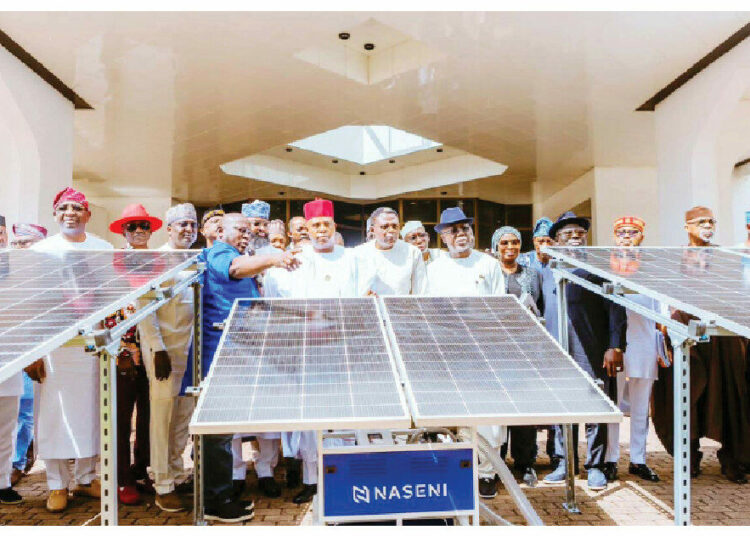Nigerian farmers are no doubt excited with the prospect of expanding their capacity to grow more crops and become richer as the National Agency for Science and Engineering Infrastructure (NASENI) has continued to aid transformation in critical sectors of the Nigerian economy, helping to boost capacity and creating technology-enabled environment for farmers to thrive.
The introduction of NASENI’s Solar-powered irrigation pump will revolutionize agriculture through increased crop production and Nigerian farmers stand to benefit in diverse ways from this.
The NASENI Solar Irrigation pumps are cost effective while providing a sustainable and reliable source of water for crops. Farmers can use the solar irrigation pump to water their crops more consistently, leading to higher yields and potentially multiple harvests per year.
It can make farmers less dependent on unpredictable rainfall patterns thereby mitigating the risks of crop failure. It eliminates the need for fossil fuels like diesel or petrol for irrigation, reducing greenhouse gas emissions and air pollution. It can also be used in areas without reliable grid access.
By using NASENI solar irrigation pump, farmers will significantly have increased agricultural productivity, lower operational cost, higher incomes and improved livelihoods than the petrol-powered irrigation pumps.
This irrigation system has been tested and found efficient, its effectiveness has encouraged more famers to ask for its deployment on a larger scale especially now that the Renewed Hope Agenda of President Bola Ahmed Tinubu has made agriculture a cornerstone of its drive to boost food security, tackle unemployment and make Nigerian agro-products more competitive in the international market.
The NASENI Solar Irrigation Pumps recently won accolades when it was endorsed by the National Economic Council (NEC) for nationwide rollout ahead of the 2025 dry-season farming.
This landmark decision, taken at NEC’s 152nd meeting held at the Presidential Villa, Abuja last Thursday underscored the Council’s confidence in NASENI’s capacity to deliver homegrown, energy-efficient solutions that directly respond to Nigeria’s food security challenges.
This development will bring succor to Nigerian farmers, who have struggled over the years with high cost of petrol of diesel-powered irrigation pumps. In line with its 3Cs mandate—Collaboration Creation, and Commercialization—NASENI developed the solar-powered irrigation pump as an affordable, energy-efficient, and sustainable alternative.
It was designed to help boost agricultural productivity by lowering operational costs for farmers, increasing yields, raising incomes, and improving rural livelihoods.
Speaking on the development, the Executive Vice Chairman/Chief Executive Officer of NASENI, Mr. Khalil Suleiman Halilu, commended NEC’s resolution. He said “the NEC’s decision is a strong vote of confidence in our ability to deliver energy-efficient, homegrown solutions that will boost food production, lower costs for farmers, and secure livelihoods.
“Special appreciation to President Bola Ahmed Tinubu for the continuous support, ensuring NASENI remains at the forefront of advancing his administration’s reforms on industrialization, technology transfer, and food security. Together, we are building a more resilient agricultural sector, harvesting more sustainably and unlocking infinite possibilities for Nigeria.”
To facilitate immediate mass production and distribution of the pumps, the NEC further mandated the Honourable Minister of Budget and Economic Planning, Senator Abubakar Atiku Bagudu, to work out funding modalities for NASENI.
This endorsement reinforces NASENI’s role as a key driver of President Tinubu’s Renewed Hope Agenda, particularly in advancing industrialization, local technology transfer, and sustainable solution.
NASENI’s solar-powered irrigation pumps offer benefits like reduced water waste, lower operational costs, and provide a reliable, renewable energy source, even in remote areas with limited access to grid electricity or fossil fuels. These systems also reduce labor, are environmentally friendly, and can provide surplus energy for other farm needs.
The investment in this sector is massive because it is worth billions of naira; however, the overall benefits to the farmers, the Nigerian state and to the policy of food security are enormous.
Apart from the fact that it reduces cost of energy, through the use of free renewable solar energy from the sun, the deployment of this system will significantly lower electricity costs associated with irrigation and enhance efficient watering that can improve farmers’ incomes and livelihoods.
NASENI Solar Irrigation Pumps eliminate the physically demanding work of fetching water, especially for women who often perform this task, saving time and effort. Also, the harvested solar energy can be used for more than just irrigation, powering other farm needs like water heaters, dryers, and lighting.
The system not only enables dry-season farming, and diversifying crop options, but also with careful planning, technical expertise, and consideration of local conditions for sustainable and profitable outcomes, the nation has limitless opportunities. Also, the multiplier effect on non-farm incomes is immense, contributing to overall economic growth.
It was, therefore, apt that NASENI is driving Nigeria’s total investment in irrigation farming. Although budget allocations to the broader agriculture sector have shown significant growth, with the 2025 budget allocating ₦826.5 billion for Agriculture, NASENI’s intervention is perhaps the one that is most direct in placing the priority of farmers on right footing and changing their fortunes for good.
Above all, the Federal Ministry of Agriculture and Food Security should increase their collaboration with NASENI. The Agency also needs extra budgetary allocation to fund some of its programmes as it has demonstrated capacity to utilize resources for the benefit of all.
NASENI’s wide network of agriculture programmes across Nigeria is the basis for hope of success of this solar powered irrigation system. NASENI has a division known as the Agricultural Machinery and Equipment Development Institute (AMEDI) which is a key operational component aimed at modernizing Nigeria’s agricultural sector.
This Institute focuses on the development of agricultural machinery, seed technologies, and soilless cultivation through projects like the pilot hydroponics farming in Lafia, Nasarawa State. The goal is to promote sustainable, mechanized farming, boost food security, and foster indigenous industrialization and job creation in the agricultural sector.
Recently the Kebbi State Government handed over ten hectares of land to NASENI for the establishment of AMEDI in Birnin-Kebbi, the state capital, which is also in line with the Federal Government’s directive that the six geopolitical zones in the country should host at least one AMEDI each.
The presence of AMEDI in the state and others with such benefits will accelerate development and create job opportunities for the teeming youths. NASENI’s efforts to enhance agriculture go beyond the country.
It has established collaboration with UN agencies on agriculture with initiatives like solar irrigation pumps and reviving agricultural machinery, which is supported by partnerships with organizations like the International Institute of Tropical Agriculture (IITA). It has also established contact with the United Nations Industrial Development Organization (UNIDO), to enhance food security and productivity in Nigeria.
These initiatives are part of the United Nations efforts to enhance climate-smart agriculture and sustainable food systems while exploring technology to address challenges faced by farmers. There are still opportunities for NASENI to bring this collaboration nearer home in West Africa. The Agency can work with ECOWAS and the African Union to focus on technology and infrastructure for mechanized farming.
In Nigeria, where malnutrition and food shortages often threaten citizens, NASENI’s investment in solar-powered irrigation pumps is a policy that must be sustained to enable Nigeria to lead regional agricultural development in West Africa and the continent in general.





